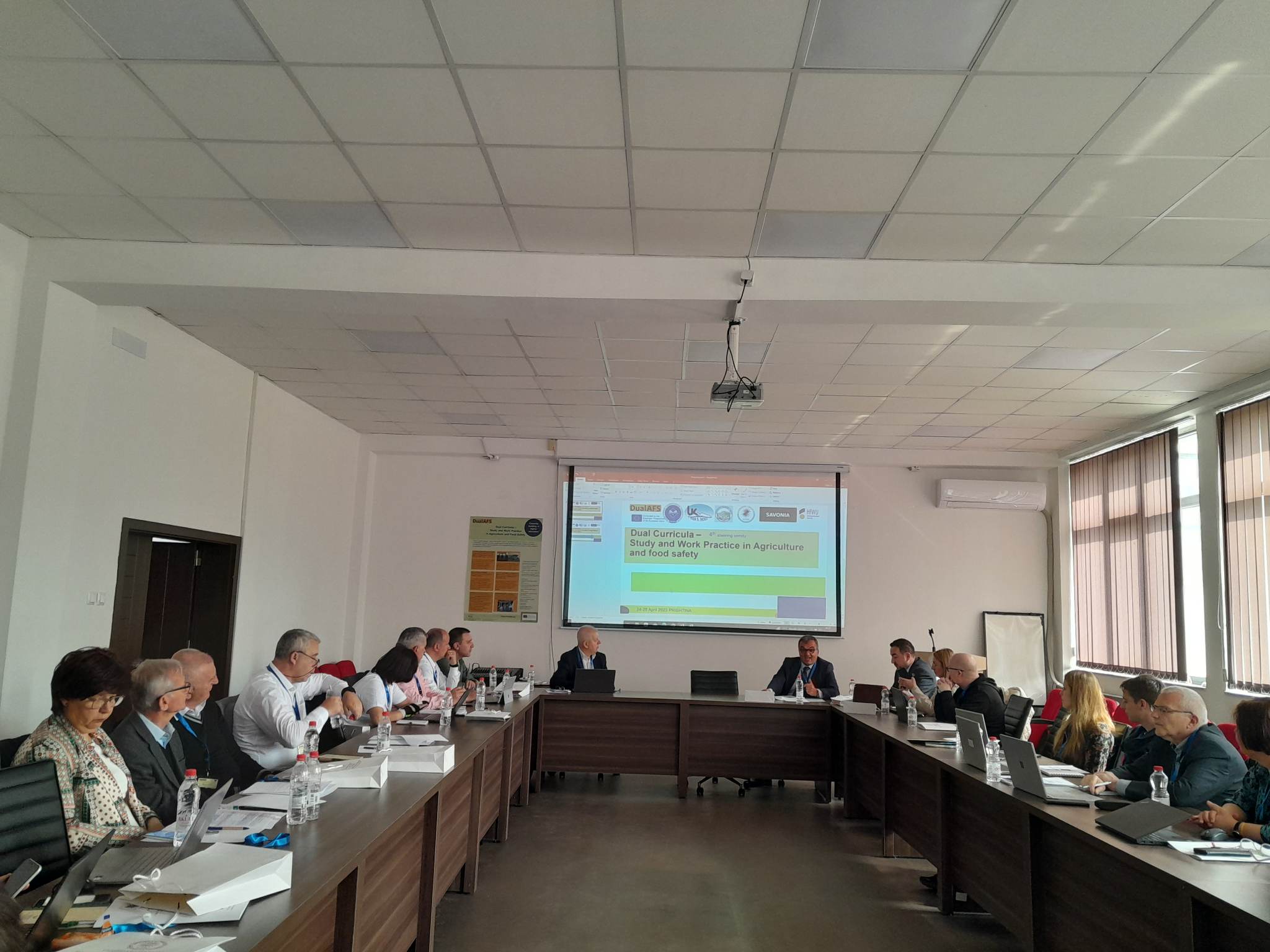Today, at the University of Prishtina, the next meeting of the partners of the ERASMUS+ project: “DUAL Curricula – Study and Work Practice in Agriculture and Food Safety (DUAL AFS)”! started.
The ERASMUS+ “Dual AFS” project, approved by the European Commission, is continuing its successfully implementation from 2021 in several Albanian speaking universities in Albania and the Republic of Kosovo. The project is coordinated by our EU partners Nuertingen-Geislingen University (Germany) in cooperation with Savonia University of Applied Sciences (Finland). The local beneficiary partners are Agricultural University of Tirana (Albania), University of Korca (Albania), Faculty for Agriculture and Veterinary, University of Prishtina (Kosovo) and University of Mitrovica (Kosovo). In addition, some work-life partners (non-university partners from agribusiness, animal production and food safety) from Albania and Kosovo have also benefited from this project.
The main coordinator of the project is Prof. Heinrich Schüle from Nürtingen‐Geislingen University (Germany), while the local coordinator is Prof. Skënder Muji from the Faculty of Agriculture and Veterinary, University of Pristina. The project will be realized in the period 15.01.2021 – 14.01.2024 (36 months), while the total value of the project for all partners is about one million Euros.
The main objective of the project is the preparation of a dual program structure (curricula) in Bachelor and Master levels (in field of animal production, agribusiness, food safety etc.), which will be comparable and consistent with counterparts from partner EU universities. For some reasons, the University of Prishtina in the framework of this project will just significantly increase the practical part within the existing classical curricula’s (in order to approach the system of dual study programs).
Agriculture and food are the dominant sectors in the rural areas and take the important share in GDP and in the employment of population in Albania and Kosovo. Consequently, higher education in agricultural sciences is of crucial importance and needs to be seriously considered. Development and modernization of the sector is determined mainly by investing in the education and training of human resources, to achieve skills to respond to the great challenges of modernization of agriculture, livestock and food sectors. In order to further increase and develop agricultural sector responding to market demands in Albania and Kosovo, there is undoubtedly necessity to have qualified and competent experts. Anyway, higher education institutions of both countries have a primary role in the development of human resources required for the development and modernization of agriculture and food sectors.
Based on the experiences of some EU countries, the dual studies model is considered as one of the most successful model of applied tertiary studies in Europe. This model is more successfully developed and implemented by German University of Cooperative Education (Berufsakademie) and University of Applied Sciences (Fachhochschule). These models of studies are also implemented, with minor modification, in some other European countries. The EU partners of our project, University of Applied Sciences of Nürtingen‐Geislingen, (HfWU) Germany, and Savonia University of Applied Sciences (SUAS), Finland, have already promising experience in the implementation of Dual curricula studies in agriculture and food. Therefore, the Consortium of the project believes that Dual studies are an efficient model and strategy to improve the linkage of tertiary studies to the needs of agriculture, livestock, food quality and safety, as well as of labor market in these sectors.
The reorganization of current curricula and strengthening of practical competences and skills will be realized through cooperation of Universities with working life partners of project. Therefore, the dual study programs of our project (DualAFS) aims for better employability of graduates, knowledge and innovation capacity in agriculture and livestock sciences and improved competitiveness of the agriculture and food business to gain better income in the future. Long term, the aim is to bring prosperity in the remote and rural regions of Albania and Kosovo.
The ERASMUS+ (EU programme for education, training, youth and sport) is an excellent support for higher education institutions especially of partner countries to internationalizeteaching and research, that is also one of the most important reform challenges of the universities in Albania and Kosovo. Consequently, this project emphasizes the student and teaching staff exchange between the West and East partners in order to support and facilitate the reorganization and reformation of study program in Kosovo and Albania. As a result, our DualAFS project will internationalize the education in agriculture, foster innovations and build solid bridges and pathways between the stakeholders on different levels. It will also improve the openness of higher education through innovative digital educational materials and supporting the availability of education.
In addition to the main objective (the development of innovative models of dual Bachelor and Master curriculas), the project Consortium has identified also the needs for: (a) strengthening practical skills of graduates through a better integration of theoretical and practical curricula of the university studies (in the current study programs), (b) earlier integration of the students into farm work life, as well as (c) the development of lifelong learning (LLL) concept for future.
In conclusion, the Erasmus+ project (DualAFS), means the re-structuring and reforming of the study programs in the sector of agriculture, according to global trends of higher education and market needs, will promote and support economic growth, employment and sustainable development in Albania and Kosovo.
The work of the steering committee of this meeting started today on 24.04.2023 (at the premises of the University of Pristina), and will continue until Friday 28.04.2023 (at the premises of the Food and Veterinary Agency of Kosovo).


